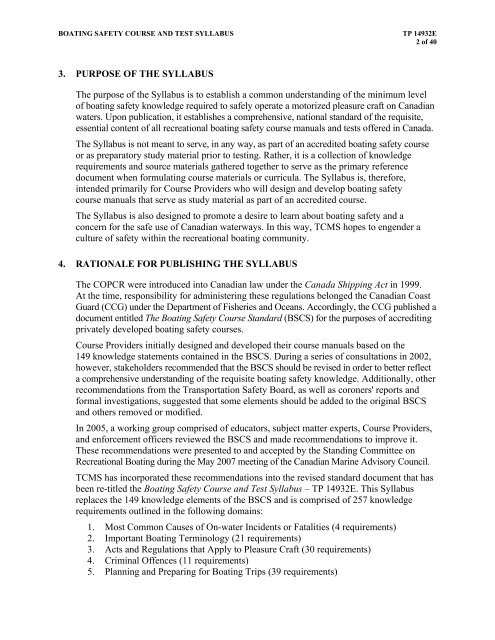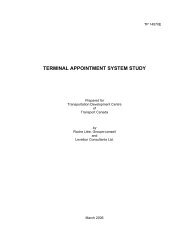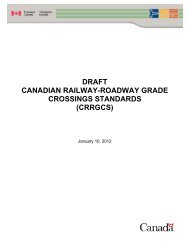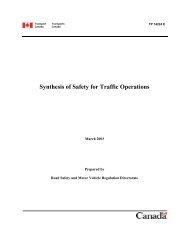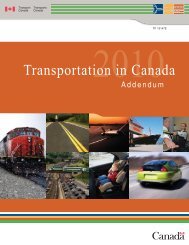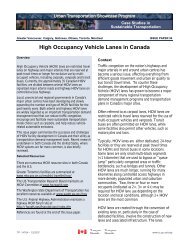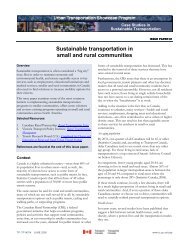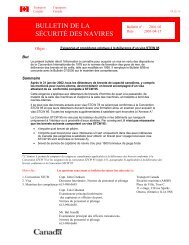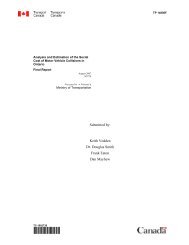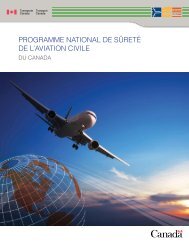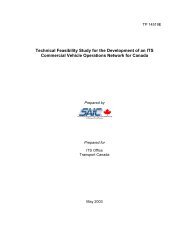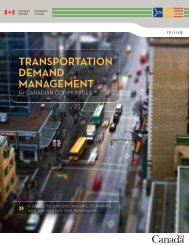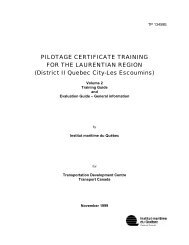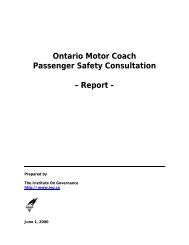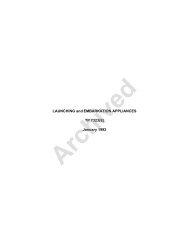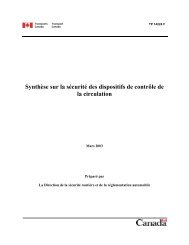Boating Safety Course and Test Syllabus - Transport Canada
Boating Safety Course and Test Syllabus - Transport Canada
Boating Safety Course and Test Syllabus - Transport Canada
Create successful ePaper yourself
Turn your PDF publications into a flip-book with our unique Google optimized e-Paper software.
BOATING SAFETY COURSE AND TEST SYLLABUS TP 14932E<br />
2 of 40<br />
3. PURPOSE OF THE SYLLABUS<br />
The purpose of the <strong>Syllabus</strong> is to establish a common underst<strong>and</strong>ing of the minimum level<br />
of boating safety knowledge required to safely operate a motorized pleasure craft on Canadian<br />
waters. Upon publication, it establishes a comprehensive, national st<strong>and</strong>ard of the requisite,<br />
essential content of all recreational boating safety course manuals <strong>and</strong> tests offered in <strong>Canada</strong>.<br />
The <strong>Syllabus</strong> is not meant to serve, in any way, as part of an accredited boating safety course<br />
or as preparatory study material prior to testing. Rather, it is a collection of knowledge<br />
requirements <strong>and</strong> source materials gathered together to serve as the primary reference<br />
document when formulating course materials or curricula. The <strong>Syllabus</strong> is, therefore,<br />
intended primarily for <strong>Course</strong> Providers who will design <strong>and</strong> develop boating safety<br />
course manuals that serve as study material as part of an accredited course.<br />
The <strong>Syllabus</strong> is also designed to promote a desire to learn about boating safety <strong>and</strong> a<br />
concern for the safe use of Canadian waterways. In this way, TCMS hopes to engender a<br />
culture of safety within the recreational boating community.<br />
4. RATIONALE FOR PUBLISHING THE SYLLABUS<br />
The COPCR were introduced into Canadian law under the <strong>Canada</strong> Shipping Act in 1999.<br />
At the time, responsibility for administering these regulations belonged the Canadian Coast<br />
Guard (CCG) under the Department of Fisheries <strong>and</strong> Oceans. Accordingly, the CCG published a<br />
document entitled The <strong>Boating</strong> <strong>Safety</strong> <strong>Course</strong> St<strong>and</strong>ard (BSCS) for the purposes of accrediting<br />
privately developed boating safety courses.<br />
<strong>Course</strong> Providers initially designed <strong>and</strong> developed their course manuals based on the<br />
149 knowledge statements contained in the BSCS. During a series of consultations in 2002,<br />
however, stakeholders recommended that the BSCS should be revised in order to better reflect<br />
a comprehensive underst<strong>and</strong>ing of the requisite boating safety knowledge. Additionally, other<br />
recommendations from the <strong>Transport</strong>ation <strong>Safety</strong> Board, as well as coroners' reports <strong>and</strong><br />
formal investigations, suggested that some elements should be added to the original BSCS<br />
<strong>and</strong> others removed or modified.<br />
In 2005, a working group comprised of educators, subject matter experts, <strong>Course</strong> Providers,<br />
<strong>and</strong> enforcement officers reviewed the BSCS <strong>and</strong> made recommendations to improve it.<br />
These recommendations were presented to <strong>and</strong> accepted by the St<strong>and</strong>ing Committee on<br />
Recreational <strong>Boating</strong> during the May 2007 meeting of the Canadian Marine Advisory Council.<br />
TCMS has incorporated these recommendations into the revised st<strong>and</strong>ard document that has<br />
been re-titled the <strong>Boating</strong> <strong>Safety</strong> <strong>Course</strong> <strong>and</strong> <strong>Test</strong> <strong>Syllabus</strong> – TP 14932E. This <strong>Syllabus</strong><br />
replaces the 149 knowledge elements of the BSCS <strong>and</strong> is comprised of 257 knowledge<br />
requirements outlined in the following domains:<br />
1. Most Common Causes of On-water Incidents or Fatalities (4 requirements)<br />
2. Important <strong>Boating</strong> Terminology (21 requirements)<br />
3. Acts <strong>and</strong> Regulations that Apply to Pleasure Craft (30 requirements)<br />
4. Criminal Offences (11 requirements)<br />
5. Planning <strong>and</strong> Preparing for <strong>Boating</strong> Trips (39 requirements)


